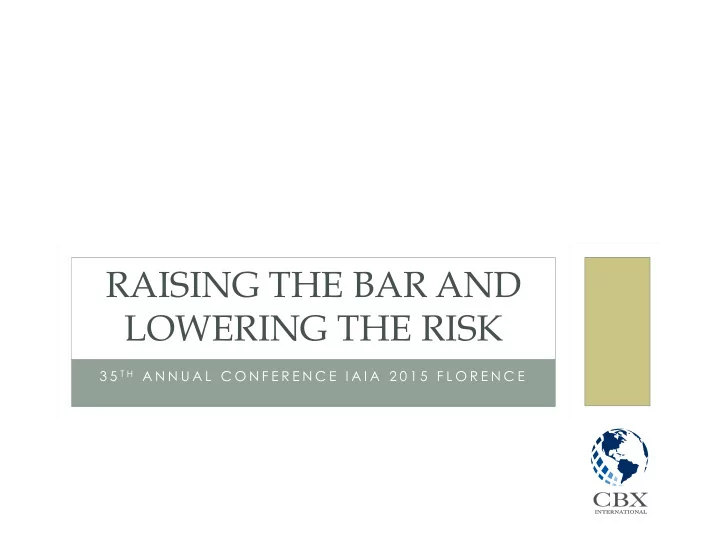

RAISING THE BAR AND LOWERING THE RISK 3 5 T H A N N U A L C O N F E R E N C E I A I A 2 0 1 5 F L O R E N C E
AGENDA • Raising the Bar • Implementing IFIs • Why Take this Approach • IFC Performance Standards • Equator Principles • Areas Exceeding Host Country Requirements • Critical Success Factors
RAISING THE BAR • International financial Institutions (IFIs) have developed environmental and social risk management practices and policies. • These practices and policies can, and frequently do, exceed the legal regulatory requirements established by host country governments. • Through this process, financial institutions have essentially “raised the bar” on the level of environmental and social review and performance for many international projects. • This presents new opportunities and challenges for project developers, financial institutions and consultants.
RAISING THE BAR CONTINUED • These practices and policies do not replace the host country laws and regulations. • Augment them with a set of widely accepted standards and guidelines. • Different FIs implement various forms of these practices and policies, with many following the lead of: • IFC Performance Standards on Environmental and Social Sustainability • World Bank Group Environmental Health and Safety Guidelines • Equator Principles
IMPLEMENTING IFIs The types of financial institutions who are implementing environmental and social reviews into their business practices include: • Multilateral Development Banks World Bank Group • Inter-American Development Bank (IDB) • European investment Bank (EIB) • Asian Development Bank (ADB) • European Bank for Reconstruction and Development (EBRD) • • Equator Principles Financial Institutions (80) Commercial Banks • Export Credit Agencies • Other investment groups • • Other Commercial Investors
WHY MANAGEMENT OF RISKS There are three types of risk a financial institution could be exposed to arising from the environmental and social issues of their clients. Credit risk: Client is not able to repay loan on account of environmental and social issues. Liability Risk: A financial institution may face legal complications, fees, and/or fines in rectifying environmental and social damage by virtue of taking possession of collateral. Reputational Risk: Negative aspects of a project harm a financial institution's image — in the media, with the public, with the business and financial Source: IFC Sustainability Training and E-learning Program communities, and even with its own staff.
WHY SUSTAINABLE FINANCE Source: IFC Sustainability Training and E-learning Program
IFC PERFORMANCE STANDARDS PS1 - Assessment and Management of Environmental and Social Risks and Impacts PS2 - Labor and Working Conditions PS3 - Resource Efficiency and Pollution Prevention PS4 - Community Health, Safety, and Security PS5 - Land Acquisition and Involuntary Resettlement PS6 - Biodiversity Conservation and Sustainable Management of Living Natural Resources PS7 - Indigenous Peoples PS8 - Cultural Heritage Applicability of individual Performance Standards depends on: Characteristics and size of project • Site-specific characteristics of project settings, economic and social conditions •
EQUATOR PRINCIPLES Principle 1: Review and Categorization Principle 2: Environmental and Social Assessment Principle 3: Applicable Environmental and Social Standards Principle 4: Environmental and Social Management System and Equator Principles Action Plan Principle 5: Stakeholder Engagement Principle 6: Grievance Mechanism Principle 7: Independent Review Principle 8: Covenants Principle 9: Independent Monitoring and Reporting Principle 10: Reporting and Transparency
AREAS EXCEEDING HOST COUNTRY REQUIREMENTS Areas where requirements of the Performance Standards typically exceed those of developing countries include: • Environmental and Social Impact Assessment • Gender and Human Rights • Indigenous People • Involuntary Resettlement • Workers Health and Safety (HR Policies and workers rights) • Public Disclosure and Consultation • Biodiversity (Ecosystems Services) • Community Health and Safety (grievance Mechanisms) • Resource Utilization and Pollution Prevention
CRITICAL SUCCESS FACTORS Institutional Strength and Knowledge • Financial institutions must have strong commitment to their E&S policies and practices • Financial institutions and their consultants must have a strong knowledge and understanding of both the host country requirements as well as those of the FI. • There needs to be a focus on results and not just process when implementing the FI’s E&S policies and practices • Adaptive risk management and implementation of continuous improvement practices
CRITICAL SUCCESS FACTORS CONTINUED Performance • Preparation of comprehensive ESIA following host country and FI’s requirements • Appropriate stakeholder engagement • Thorough Environmental and Social Due Diligence • Focused Environmental and Social Action Plan • Effective Environmental and Social Management System • Accurate and timely monitoring and reporting • Appropriate project technology and resource utilization
IMPLEMENTATION OF LENDERS REQUIREMENTS CAN IMPROVE Project!Siting!and!Design! ! PROJECT PERFORMANCE !! ! !!!!! Agency!Coordination! Coordinate!with!Lender! Lenders requirements • can best be met through early project planning and Develop!Permitting!Scope! SOW!to!Include!Lender’s! coordination. of!Work! E&S!Requirements! While not always • possible depending Impact!Assessment!and! upon entry of financial Lender!Conducts!ESDD! Permit!Application(s)! institution into the process, this approach can save valuable Submit!Application!and! development time and Development!of!ESAP! Agency!Review! resources. The early integration of • the lenders Permit!Issued! Financing!Approved! requirements can minimize the need to revise ESIA, public disclosure and Construction!Monitoring! E&S!Monitoring! consultation process and!Reporting! and other critical items.
COMPONENTS OF A SUCCESSFUL PROJECT/ACTIVITY 100% In-Country Regulatory Compliance Environmental Compliance with Sustainability and IFC PS Social Responsability Best Practices
QUESTIONS Cleone Botelho Randy Schulze CBX International 303-601-4349 Cleone@cbxinternational.net
Recommend
More recommend